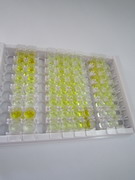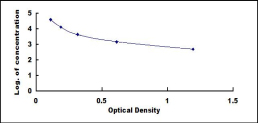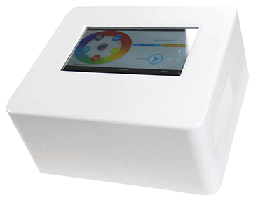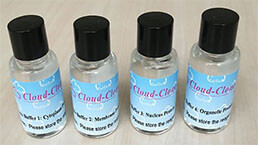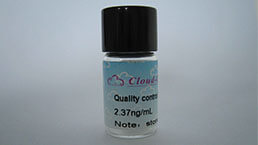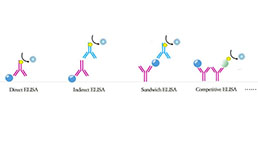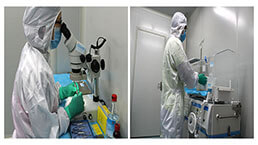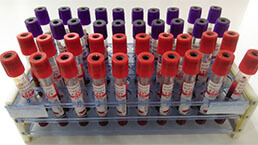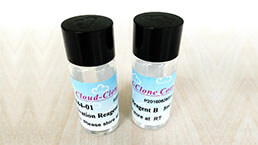Packages (Simulation)

Reagent Preparation

Image (I)
Image (II)
Certificate


ELISA Kit for Apolipoprotein E (APOE)
Apo-E; AD2; Apoprotein; Alzheimer Disease 2(E4-Associated,Late Onset
- Product No.CEA704Rb
- Organism SpeciesOryctolagus cuniculus (Rabbit) Same name, Different species.
- Sample TypeSerum, plasma and other biological fluids
- Test MethodCompetitive Inhibition
- Assay Length2h
- Detection Range493.8-40,000pg/mL
- SensitivityThe minimum detectable dose of this kit is typically less than 182.5pg/mL.
- DownloadInstruction Manual
- UOM 48T96T 96T*5 96T*10 96T*100
- FOB
US$ 479
US$ 684
US$ 3078
US$ 5814
US$ 47880
For more details, please contact local distributors!
Specificity
This assay has high sensitivity and excellent specificity for detection of Apolipoprotein E (APOE).
No significant cross-reactivity or interference between Apolipoprotein E (APOE) and analogues was observed.
Recovery
Matrices listed below were spiked with certain level of recombinant Apolipoprotein E (APOE) and the recovery rates were calculated by comparing the measured value to the expected amount of Apolipoprotein E (APOE) in samples.
| Matrix | Recovery range (%) | Average(%) |
| serum(n=5) | 79-101 | 83 |
| EDTA plasma(n=5) | 81-90 | 86 |
| heparin plasma(n=5) | 86-101 | 97 |
Precision
Intra-assay Precision (Precision within an assay): 3 samples with low, middle and high level Apolipoprotein E (APOE) were tested 20 times on one plate, respectively.
Inter-assay Precision (Precision between assays): 3 samples with low, middle and high level Apolipoprotein E (APOE) were tested on 3 different plates, 8 replicates in each plate.
CV(%) = SD/meanX100
Intra-Assay: CV<10%
Inter-Assay: CV<12%
Linearity
The linearity of the kit was assayed by testing samples spiked with appropriate concentration of Apolipoprotein E (APOE) and their serial dilutions. The results were demonstrated by the percentage of calculated concentration to the expected.
| Sample | 1:2 | 1:4 | 1:8 | 1:16 |
| serum(n=5) | 86-93% | 78-101% | 82-102% | 96-104% |
| EDTA plasma(n=5) | 89-96% | 99-105% | 80-104% | 90-97% |
| heparin plasma(n=5) | 89-103% | 90-97% | 90-101% | 81-89% |
Stability
The stability of kit is determined by the loss rate of activity. The loss rate of this kit is less than 5% within the expiration date under appropriate storage condition.
To minimize extra influence on the performance, operation procedures and lab conditions, especially room temperature, air humidity, incubator temperature should be strictly controlled. It is also strongly suggested that the whole assay is performed by the same operator from the beginning to the end.
Reagents and materials provided
| Reagents | Quantity | Reagents | Quantity |
| Pre-coated, ready to use 96-well strip plate | 1 | Plate sealer for 96 wells | 4 |
| Standard | 2 | Standard Diluent | 1×20mL |
| Detection Reagent A | 1×120µL | Assay Diluent A | 1×12mL |
| Detection Reagent B | 1×120µL | Assay Diluent B | 1×12mL |
| TMB Substrate | 1×9mL | Stop Solution | 1×6mL |
| Wash Buffer (30 × concentrate) | 1×20mL | Instruction manual | 1 |
Assay procedure summary
1. Prepare all reagents, samples and standards;
2. Add 50µL standard or sample to each well.
And then add 50µL prepared Detection Reagent A immediately.
Shake and mix. Incubate 1 hour at 37°C;
3. Aspirate and wash 3 times;
4. Add 100µL prepared Detection Reagent B. Incubate 30 minutes at 37°C;
5. Aspirate and wash 5 times;
6. Add 90µL Substrate Solution. Incubate 10-20 minutes at 37°C;
7. Add 50µL Stop Solution. Read at 450 nm immediately.
GIVEAWAYS
INCREMENT SERVICES
| Magazine | Citations |
| Seizure - European Journal of Epilepsy | Cerebrospinal fluid apolipoprotein E concentration decreases after seizure Seizure: PIIS1059131109002441 |
| Biochimica et Biophysica Acta | Hepatic lipase- and endothelial lipase-deficiency in mice promotes macrophage-to-feces RCT and HDL antioxidant properties PubMed: 23328279 |
| Medical Oncology | Expression and clinical significance of apolipoprotein E in pancreatic ductal adenocarcinoma Pubmed: 23609192 |
| Diabetes. | Adipocyte Atp-Binding Cassette G1 Promotes Triglyceride Storage, Fat Mass Growth And Human Obesity Pubmed:25249572 |
| renal failure | Frequencies of apolipoprotein E alleles in depressed patients undergoing hemodialysis – a case-control study PubMed: 25707516 |
| Biochim Biophys Acta | Culturing of HepG2 cells with human serum improve their functionality and suitability in studies of lipid metabolism PubMed: 26515253 |
| Diabetes | Adipocyte ATP-binding cassette G1 promotes triglyceride storage, fat mass growth, and human obesity PubMed: 25249572 |
| Scientific Reports | Adaptive immunity against gut microbiota enhances apoE-mediated immune regulation andreduces atherosclerosis and western-diet-related inflammation. pubmed:27383250 |
| Biochemical Pharmacology | Differential effects of apoE and apoJ mimetic peptides on the action of an anti-Aβ scFv in 3xTg-AD mice Pubmed:30026023 |
| Oncotarget | Deletion of plasma Phospholipid Transfer Protein (PLTP) increases microglial phagocytosis and reduces cerebral amyloid-β deposition in the J20 mouse … Pubmed:29731975 |
| Proteomics Clinical Applications | Comparative proteomics analysis of serum proteins in gestational diabetes during early and middle stages of pregnancy Pubmed: 31162828 |
| Nature Communications | Hepatic HuR modulates lipid homeostasis in response to high-fat diet Pubmed: 32546794 |
| VETERINARY PATHOLOGY | Pathology and Proteomics-Based Diagnosis of Localized Light-Chain Amyloidosis in Dogs and Cats Pubmed: 32880234 |
| Journal of Clinical Medicine | The Significance of Apolipoprotein E Measurement in the Screening of Fetal Down Syndrome 33321701 |
| Cancer Cell Int | Discovery and validation of FBLN1 and ANT3 as potential biomarkers for early detection of cervical cancer 33602229 |
| Nat Commun | GP73 is a TBC-domain Rab GTPase-activating protein contributing to the pathogenesis of non-alcoholic fatty liver disease without obesity 34853313 |
| Talanta | Iridium nanoclusters as high sensitive-tunable elemental labels for immunoassays: Determination of IgE and APOE in aqueous humor by inductively coupled … Pubmed:35378356 |
| Analytica Chimica Acta | Gold nanoclusters as elemental label for the sequential quantification of apolipoprotein E and metallothionein 2A in individual human cells of the retinal … Pubmed:35361429 |
| Catalog No. | Related products for research use of Oryctolagus cuniculus (Rabbit) Organism species | Applications (RESEARCH USE ONLY!) |
| RPA704Rb01 | Recombinant Apolipoprotein E (APOE) | Positive Control; Immunogen; SDS-PAGE; WB. |
| PAA704Rb51 | Polyclonal Antibody to Apolipoprotein E (APOE) | WB; IHC; ICC; IP. |
| MAA704Rb21 | Monoclonal Antibody to Apolipoprotein E (APOE) | WB; IHC; ICC; IP. |
| SEA704Rb | ELISA Kit for Apolipoprotein E (APOE) | Enzyme-linked immunosorbent assay for Antigen Detection. |
| CEA704Rb | ELISA Kit for Apolipoprotein E (APOE) | Enzyme-linked immunosorbent assay for Antigen Detection. |
| LMA704Rb | Multiplex Assay Kit for Apolipoprotein E (APOE) ,etc. by FLIA (Flow Luminescence Immunoassay) | FLIA Kit for Antigen Detection. |

